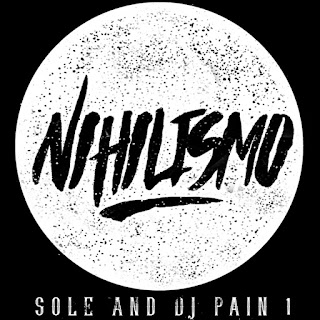 |
| Pieces in Space by Sammus |
Right now, what hip-hop needs more of than continued participation from strong black male emcees (still enormously important) is continued participation in the art from strong female black emcees. It is true that the cultural philosophy of real hip-hop is all inclusive when it comes to bringing different types of people into the fray, but it is extremely urgent and very necessary that hip-hop keep giving a voice and stage to good respectable women of African descent since the mainstream media obviously, deliberately and harmfully favor ladies of lighter skin tones most of the time. Enter Sammus (Enongo Lumumba-Kasongo) – Ithaca, New York native, teacher, PhD student, producer and conscious complex rhymer with nerdcore tendencies (mind her stage name that pays homage to Metroid heroine Samus Aran) and a keen unquenchable interest on sharing her wonderful thoughts and ideas with the world.
The product of a robust youth, a healthy education and a complicated professional work life, Sammus learned much from the upright upbringing she received from her immigrant parents who were professors in academia before her. Though even with an Ivy League bachelors degree from Cornell University and a handsome lot in life made out for her, the undying spirit in Sammus yearned for more. Expressive, impressive and genuine in past works, albums like M’Other Brain (2012) and Prime (2013), she has regularly felt at odds with the machine of modern day society and the typical nature of relationships but she finds release in grasping onto her passions for rapping and beatmaking. She’s put it all on wax before and she continues to do so. All her feelings of being frustrated and fragmented by life but also her hopes, dreams and triumphs come out in new form on her latest LP, the emotively exceptional Pieces in Space, out now courtesy of Don Giovanni Records/NuBlack Music Group.
Pieces is written, performed and executive produced by Sammus herself, with help from studio handyman Alejandro Tello Jr., a trio of side instrumentalists and her invites of course: cognition-sparker Latasha “LA” Alcindor, Alex Attard, Queens’ own Homeboy Sandman, Izzy True, genius Jean Grae, a very open Open Mike Eagle and Arch Thompson. Sammus is an incredible emcee, but her productions deserve special mention too. She’s been crafting and assembling sounds on tracks in addition to rapping for several years now so her in-touch familiarity with the current state of beats has brought much instrumental freshness to Pieces. You’ll get hooked by the majestic keys, soft sampling and frequent drops of “100 Percent,” you’ll lose yourself in a dreamy escape of sax, synthy horns and rapidly successive snares in “Cubicle,” and smile from the steady rocky pop of “Nighttime,” to pull just a few. These beats are firm, cool, dynamic and layered, just like Sammus.
Her conceptual variety and multidimensional character are most striking however. Each piece of Pieces is dedicated and committed to a unique goal and pursuit. With exemplary wordplay, Sammus holds rappers to a particularly high standard in “100 Percent,” and she can because she’s such a phenomenal word miracle worker, and she smashes pathetic trolls and slow roasts them to a crisp in “Comments Disabled.” Then she gets lighter in her next two cuts by reminiscing on being a kid with again, amazing lyricism, in “Childhood” and by dreaming big, reaching high and working at it endlessly in “Cubicle.” Along comes “Perfect, Dark” where Sammus reiterates the need for strong black female role models in popular culture refraining, “black girls wanna have a hero too, all kids tryna get that mirror view, cartoons gotta represent my hue, they got our doctors sick, they want the Theraflu.” Her pushing pressing tone crescendos toward the end to a liberating revelation. She says, “had to wait until I saw that I’m a work of art, I love the game but I’m the realest kind of perfect art.”
Sammus’s “Song About Sex,” another one of Pieces’ most powerful gems, teaches the ladies that good sex doesn’t mean anything if their guy is a loser. Pay attention there to her challengingly clustered chorus that she pulls off and executes with seasoned skill and talented delivery. Along with the goodwill in her messages, Sammus is tough as well. “Genius” brainstorms and reigns with further muscular musings. Sammus raps, “it’s a pattern that I noticed from haters of lots of rappers, some rather see us going the way of velociraptors, disturbed to see us turning that turner on all our captors, determined to mass-murdering words up on every rap verse.” Other times, she courageously and comfortably embraces her quirks and how she differs with the norm (“Weirdo”), admits to her struggles and conflicts of conscience concerning school, work, fashion, etc. (“1080p”) and fears turning off her partner by baring her soul and exposing herself (“Qualified”).
Sammus is a balanced act. She has actual worries and vulnerabilities like all of us, but she isn’t afraid to discuss them. With Pieces in Space, she gives us another superb collection of excellent rap songs for everyone. It’s distinguished from her first two studio albums, and it’s signature Sammus through and through, appealable to every age, race, class and gender under the sun, a one stop shop too if you don’t mind the comparison. Her rise is so exciting and so cool because she uses good natured force, understanding and energy as propellants. Plus, she’s not timid or flakey about showing off the pro rap techniques of her extraordinary artistic station. It has been said before about other artists, but the same is true here – Sammus is a complete package of a hip-hopper and further proof and evidence that the best music of the trade is found underground and from independent sources.
5 out of 5 stars












